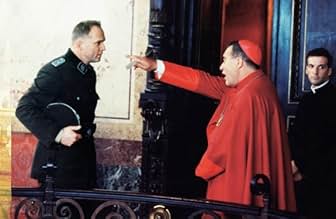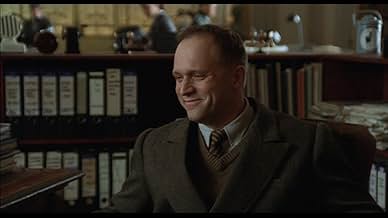Amen.
- 2002
- Tous publics
- 2h 12m
During WWII SS officer Kurt Gerstein tries to inform Pope Pius XII about Jews being sent to extermination camps. Young Jesuit priest Riccardo Fontana helps him in the difficult mission to in... Read allDuring WWII SS officer Kurt Gerstein tries to inform Pope Pius XII about Jews being sent to extermination camps. Young Jesuit priest Riccardo Fontana helps him in the difficult mission to inform the world.During WWII SS officer Kurt Gerstein tries to inform Pope Pius XII about Jews being sent to extermination camps. Young Jesuit priest Riccardo Fontana helps him in the difficult mission to inform the world.
- Director
- Writers
- Stars
- Awards
- 4 wins & 9 nominations total
- Director
- Writers
- All cast & crew
- Production, box office & more at IMDbPro
Featured reviews
I do not have the knowledge of history to know whether this story is accurate or manipulative, but as a movie it is powerful and striking. Costa-Gavras directs this film about Holocaust based on the history of the German Kurt Gerstein, who unsuccessfully tried to tell the world about the mass murderers in the concentration camps. The performance of Ulrich Tukur is magnificent, giving total credibility to his character. With regard to the role of the Catholic Church, I believe the exposition is simplistic and does not show the big picture of the political environment that the Vatican was living in that historical moment, focusing only in the attempt of the SS officer in having an audience with the Pope. My vote is eight.
Title (Brazil): "Amém." ("Amen.")
This is noticeably a continental European film, with brilliant direction and dazzlingly good acting, more Gosford Park than Schindler's List in terms of pace. Indeed, this slow pace only highlights the frustration felt by the two main characters as they are continually beaten down by the well-meaning leaders of their Churches.
Frustration, interestingly, is the only lasting emotion inspired in the viewer. Dr Germaine Greer attributed this, wrongly, I believe, to the fact that the film "doesn't seem to go anywhere", highlighting the leitmotiv frame of a so-called 'goods' train on its way to an unseen destination as a representation of this lack of direction. I would venture to suggest, though, that a conclusion is precisely what the director, the justly renowned Costa Garvas, was trying to avoid - he does not straightjacket his characters plainly as either heroes or villains and the film closes with the issues of morality it has raised left open-ended. It is meant to be thought provoking, not moving; the viewer is meant to conclude for himself what was morally correct and what was not.
At the end of the film, I found myself wondering which of the characters was most right - for none, it would seem, have a sole handle on the moral high-ground and there are arguments that promote each character's actions over another's. Whatever way you see this film and whatever conclusion you draw, it is a production which will not let you sleep easy until you have been challenged on many issues of morality.
This is an excellent film, and exemplifies, I think, the role of the arts in raising society's level of conscience and effecting social change. It galls me that a mind set is growing, (sixty years later) that refutes the occurrence of the holocaust. All the pictures, names and movie footage in the world will never change these people's minds; convincing them is not the issue. But when you take on the large institutions of society, when you make them accountable and demand that they fess up to their inadequacies, and that they not allow it to happen again, then you get the kind of permanent, positive change that is not eroded by a capricious shift in the political winds.
The amazing thing about this film was the powerful effect it achieved with very little, if any, shocking footage. We are conditioned to look away from all the "standard" holocaust images - the drawn faces, the gaunt skeletons, the bones in the ovens, the piles of shoes and personal effects. Instead, Gavras uses Gerstein's involvement with the engineering side of the issue, and paints a chilling picture of the magnitude of the killings. The project management meetings where they discuss the efficiency improvement strategies for gassing people and cleaning out the chambers are eerily similar to meetings I and many other Dilbert-types attend on a regular basis. The final scene at the camp where all the SS facilities officers chorus their concerns over decreased KILLING efficiency is ridiculously chilling. These guys could be whining about their bottom line numbers at a board meeting for any major corporation.
Gavras hammers home the numbers with the repeated scenes of empty trains going and full trains coming - and you never see a person in the full ones, only closed doors. Think about the numbers. A million people a year is nearly three thousand a day. Instead of making his point with stark images, the way so many other films have, Gavras keeps hammering the shear logistics, the size of the camps, the amounts of the gas needed, the HUGE numbers of people that had to be transported. Think of how big a train with a thousand people is - that's over three times the capacity of the biggest airliners. Gerstein's confrontation with his old friend, the transportation officer, points out how people could vilify certain nazis (SS and Gestapo), and yet remain conveniently ignorant of their own complicity.
The Vatican issued a watered down apology in 1998, admitting partial culpability and asking forgiveness. There are still many who believe that the diplomatic tightrope the Vatican walked was the best course. The conversation between Cardinal Maglione and the German ambassador is accurately taken directly from the Vatican archives. But Gavras makes a valid case that the arguments against outing the German killing machine were weak. That other protests had yielded positive results (look up the 1943 Rosenstrasse uprising) and that the motivations for not acting more decisively were based in part on anti-Semitism, along with diplomatic prudence.
Gavras trys to show that many people who could have acted knew all the facts and chose not to act. I remember, around the time Gavras' released "Z", how the protesters at the 1968 democratic national convention chanted "THE WHOLE WORLD IS WATCHING. THE WHOLE WORLD IS WATCHING!" It didn't matter then, and Gavras makes the case that it didn't matter during the holocaust; the political powers of the world move at their own pace.
Now, sixty years later, we have the last of the actual participants dying off. WWII veterans here in the USA are dying at a rate of 1500 a day, and their ranks are dwindling. There are fewer and fewer left to tell the story or be held accountable. It is incumbent on us, however, to uncover the cover-ups, identify the systems or methods that allowed such atrocities to happen, and make the changes in our society's structure to ensure they don't happen again. Gavras' film effectively does this. Like the principals in the film, we now know the real story. Like the principals in the film, how we act with this knowledge will be judged by future generations.
Did you know
- TriviaStefan Lux was a Jewish Czech journalist, who committed suicide in the general assembly room of the League of Nations during its session on July 3, 1936, to alert the world on the perils of German anti-Semitism. After shouting "C'est le dernier coup" ("This is the final blow") he shot himself with a revolver.
- GoofsIn one of the scenes they say that the Treblinka camp is out of gas, referring to Zyklon B. Treblinka didn't use Zyklon B, instead they used carbon monoxide.
- Quotes
[first lines]
Stephan Lux: [interrupting a session of the Assembly of the League of Nations, Geneve, 1936] My name is Stephan Lux. I am Jewish. The Jews are being persecuted in Germany and the world doesn't care.
[He draws a pistol]
Stephan Lux: I see no other way to reach people's hearts.
[He shoots himself]
- ConnectionsReferenced in Kaamelott: Amen (2005)
- SoundtracksThe Train I /II
Composed and arranged by Armand Amar
Orchestra:
Jean-Philippe Audin, Elsa Benabdallah, Igor Boranian, Fabien Boudot, Florent Bremond, Karen Brunon, Nathalie Carlucci, Hervé Cavellier, Emmanuel Gaugué, Thierry Köhl, Julien Leenhardt, Bobin Minalli Bella, Marthe Moinet, Yves Monciero, Philippe Morel, Amèlie Paradis, Emmanuel Raynaud, Alexandre Sauvaire
(P) & © 2002 Long Distance/France
- How long is Amen.?Powered by Alexa
Details
- Release date
- Countries of origin
- Official sites
- Languages
- Also known as
- Le Vicaire
- Filming locations
- Production companies
- See more company credits at IMDbPro
Box office
- Budget
- FRF 103,000,000 (estimated)
- Gross US & Canada
- $274,299
- Opening weekend US & Canada
- $16,284
- Jan 26, 2003
- Gross worldwide
- $8,419,052
- Runtime2 hours 12 minutes
- Color
- Sound mix
- Aspect ratio
- 1.85 : 1
Contribute to this page


































